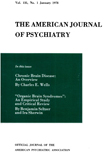Abstract
It was attempted to study some effects of nonconvulsive electric-stimulation as they are reflected in psychological test performances. The experimental group consisted of 19 white, male patients of a veterans hospital who were diagnosed as severe neurotic or mild, borderline schizophrenics, and who had not received insulin or electric therapy before. The control group was composed of 15 white, male patients of a veterans mental hygiene clinic carrying similar diagnoses and comparable for initial test scores.
Tests of intellectual functioning (Revised Beta Examination, Wechsler Memory Scale, Form I, and some other tests of cognitive functions) were administered to the whole experimental group before EST and from 0 to 6 days after the 10th treatment. The control group was tested and retested with the Revised Beta and the Wechsler Memory Scale, Form I, at comparable time intervals. All tests of the experimental group showed a gain in mean scores upon retest after the 10th treatment but this increase was not significantly different from the increase obtained in the control group. The conclusion seems to be justified that no impairment or gain in cognitive functions were discernible as far as these functions are measurable by the tests used.
In order to assess the influence of a larger number of ESTs, 9 patients of the experimental group were tested with the same tests for a third time after successful completion of the treatment series, which varied from 14 to 41 ESTs. The group continued to make gains on the tests. As there are no controls available for this phase of the study, one can only infer that learning ability does not seem to be adversely affected by such a number of, ESTs.
Ten patients of the experimental group were tested with the Minnesota Multiphasic Personality Inventory (MMPI) and the Rorschach before and after completion of treatment. Significant differences were found between the pre-and posttesting for the categories hypochondriasis, depression, hysteria, and psychasthenia. An item analysis showed changes in the direction away from abnormal trends, indicating that the patients as a group felt reduction in somatic complaints, increase in energy and emotional control, as well as improvement in the ability to concentrate. Quantitative analysis of the Rorschach record showed no significant indications of change except for minor alterations pointing up a trend toward increase of emotional control and adjustment to environment. Statistical results must be interpreted in the light of the fact that there is no control group for the MMPI and Rorschach and that the mean differences might be the result of sampling error.
Further and carefully controlled studies are needed. Also needed are additional, more refined, and qualitatively oriented psychological investigations that may reveal more subtle emotional and intellectual changes that escape our notice, when we use standard, quantitative testing methods.

